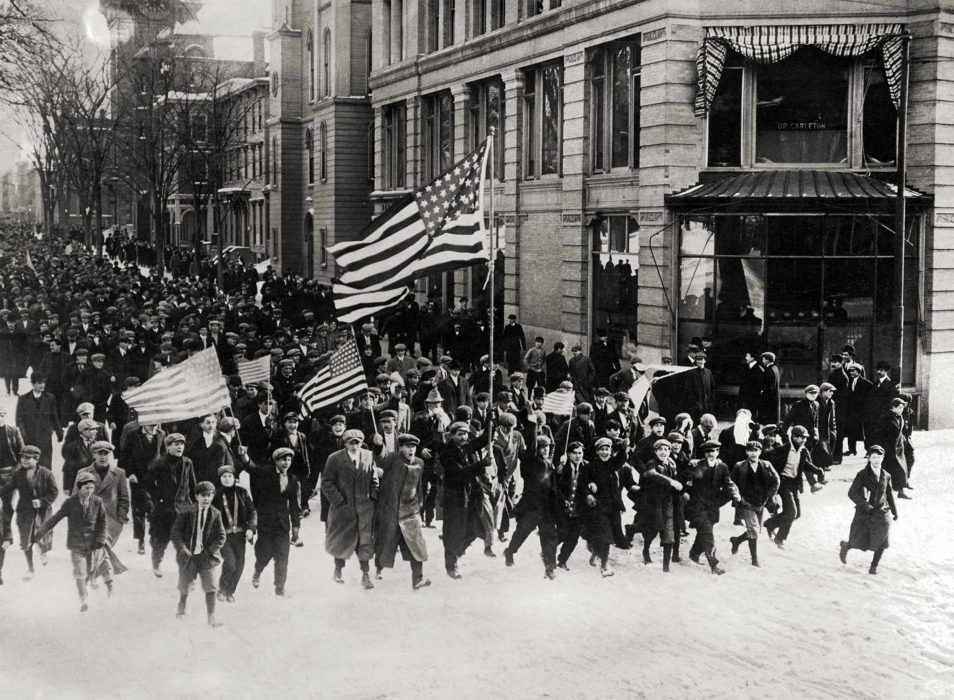THE AIR IS CHILLY tonight. The time is well past midnight and most of Dublin is asleep. At Brush Farm, George de Forest Brush is chatting with his guest, Margaret Sanger, who is busy adding another log to the fire. Margaret writes a column for the Socialist newspaper the New York Call. Three months from now she will start a new series on sex education entitled “What Every Girl Should Know,” which will be censored by the United States Post Office. Tonight she departs from the theme of women’s health and talks to George about Oscar Wilde’s essay, “The Soul of Man under Socialism.”
Margaret Sanger is one of the leading members of the Socialist Party of America and the radical labor union the Industrial Workers of the World, or IWW for short. Earlier this year, on February 9, she had helped evacuate two hundred children from Lawrence, Massachusetts, where a strike of millworkers was taking place. The strikers were mainly immigrant women and they were striking over a pay cut. Industrial unrest is making itself felt in America and Margaret is in the thick of it. So tonight, as she sits down to her cozy chat by the fire on Brush Farm, she does so with enthusiasm.

‘Abdu’l-Bahá is sleeping tonight, but he had addressed the problem of strikes even before he was freed from house arrest in Palestine. “The principal cause of these difficulties,” he said, “lies in the laws of the present civilization; for they lead to a small number of individuals accumulating incomparable fortunes, beyond their needs, while the greater number remain destitute.”
“Rules and laws should be established to regulate the excessive fortunes of certain private individuals,” ‘Abdu’l-Bahá asserted, “and meet the needs of millions of the poor masses.” But, as usual, he rejected the fundamental premise of Socialism: that perfect economic equality should be legislated. Excessive equality, he argued, would destroy the body politic: “Absolute equality is just as impossible, for absolute equality in fortunes, honors, commerce, agriculture, industry would end in disorderliness, in chaos.”
George de Forest Brush’s ideas on Socialism vary greatly from those of Oscar Wilde and Margaret Sanger. Wilde considers all manual labor “absolutely degrading.” Margaret asks Brush a question: “You would not leave man [to] continue to do the laborious and disagreeable work which has so enslaved and degraded him today?”
George leans back in his chair. He is thoroughly enjoying the subject. His eyes sparkle as he answers her. “Labor is the most delightful thing in the world when one does the thing one loves to do,” he says quietly. “When man labors for the joy of it, when everything he does will be a thing of beauty, there will be joy in his labor.”

A log falls and Margaret prods it with the poker. Their conversation has veered away from Oscar Wilde and Socialism. As the night gets darker and quieter, and the fire burns low in the grate, George de Forest Brush rises and raises his hand in a goodnight to Margaret.
“In my Socialism there will be no getting on without art,” he says, “for every act of life will be an emotion and every work a piece of art.”
In New York in June, to an audience at his residence at 309 West 78th Street, ‘Abdu’l-Bahá explained Bahá’u’lláh’s position on work. “All humanity must obtain a livelihood by sweat of the brow and bodily exertion,” he said, “at the same time seeking to lift the burden of others, striving to be the source of comfort to souls and facilitating the means of living. This in itself is devotion to God.”






